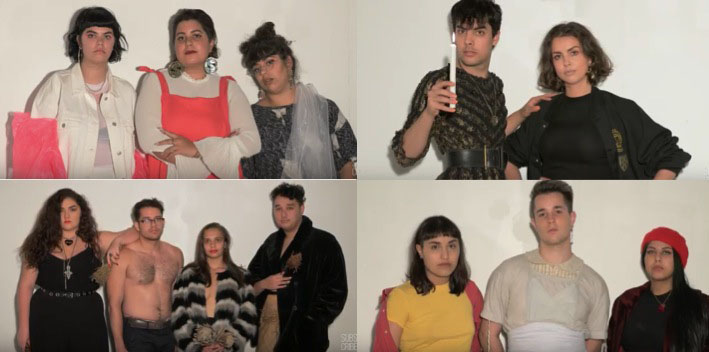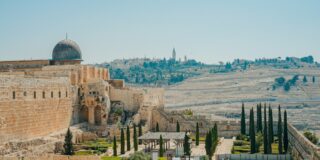
Writer Luke Bodley and photographer Matthew Vandeputte created the audio-visual poem BEND as part of Youtube’s #ShareSomeGood campaign.
The initiative calls on Australians to share content that promotes respect, tolerance, diversity and inclusion in order to combat hate speech, bigotry and violence in online spaces.
BEND has at its core the message “listen lovingly to difference”, and explores socio-cultural and sexual inclusion. As Vandeputte observes, “the goal of our short film is to open people’s eyes to the message that just because something is different doesn’t mean that it’s bad.”
You can watch the whole video here.
Right Now took the chance to catch up with Bodley and Vandeputte to learn more about the origins of the work and why it’s imperative to promote messages of tolerance and inclusion.
What inspired you to make the video? Can you explain how the concept came about?
Matthew Vandeputte: I was asked to be a part of the #ShareSomeGood Youtube Creator Bootcamp, an event hosted by Google and Youtube about six months ago, which revolved around anti-hate speech. A key message at that event for the attending creators was to use your audience for something good. I’ve always felt the need to create video or film content that would resonate with people, make them think, or at least have some sort of social or cultural impact.
After talking to some people about being involved in this campaign I eventually ended up talking to Luke via a mutual friend. We hit it off, and before we knew it we were conceptualising our project. Luke’s an incredibly talented writer and creative and complemented my technical skills in the creative department enormously.
Luke Bodley: I was approached by Matthew to collaborate on a video that aggrandised ‘difference’, socio-cultural and sexual. I felt less inspired and more compelled to articfactually reproduce the culture-sex intersect, as it applied to my ‘secret history’. I have felt recently the need to commit an act of near-naked self-exposure, to break the bonds forged by self-imposed ‘secrecy’ and ‘assimilation’. I have always been aware of the dearth of brown, black and queer bodies in pop-populist media; I remember when I was 15, trawling through the early architecture of the internet for people like me. So the piece is both a kind of personal afflatus – a letting-go and an opening-up – and a small addition to the growing oeuvre of queer POCs.
I originally began writing and conceptualising the piece as an audio-visual autobiography that was to trace, however obliquely, my ‘conversion’ from pubescent Christian doctrinaire to queer, philosophy-loving brown-boy (both states are beholden to their own silly circumscriptions). But the process expanded past the ‘this-is-me’ myopia to include other voices and bodies.
Why is it important to make such a video at this moment in Australia?
Luke Bodley: The Australian, and global, political landscape is in the midst of a rather antagonistic polarity. So many people seem ideologically static, stuck to some particular paradigm – something that totalises all facts under a single maxim. A diminutive stance of such a kind, by eclipsing ‘truth’ and ‘truthiness’, makes obscurantism, othering and obstruction easy.
This short film is important because it evades these unitary or monologic forms of interpretation/being. As a multi-media/polyvocal representation of brownness and queerness, it does not have ‘a message’ – rather it is many-messaged, many-bodied, mangled. I hope that these multiplicities awaken people to the danger of dogma.
Matthew Vandeputte: It’s not only important in Australia, I’d say it’s important everywhere. It’s important wherever you are to acknowledge and actively work against negativity and hate. The internet can be a pretty dark place due to anonymity, however it is also the perfect place to share positivity and showcase different opinions and cultures.
What needs to change in the Australian context in terms of understanding of, and tolerance for gender diversity?
Luke Bodley: The Australian political bloc needs to widen its socio-historical scope; let us not inflate colonial Christendom, Anglo-Celtic digger mythology and whiteness. We must carefully decipher the layers and intersections – the relations of ‘power’ – that constitute multicultural Australia or, more aptly stated, multi-Australia. We must carefully unmake the mythos of the invincible, hard-headed bloke. Most importantly, we must redress the ‘Great Australian Silence’ – our inattention to ‘Terra nullius’, genocide, Stolen Generations, the cultural ‘other’ and now, the state-sponsored incarceration of refugees. Modern Australians do not have to be coal-chugging, bible-thumping ‘mates’ blind to historical and present ills. We have the capacity to be thoughtful, sensitive and open.
Matthew Vandeputte: There needs to be a fundamental change in the perception of difference. Just because something is unknown or feels ‘weird’ doesn’t mean that it’s bad. Luke’s key message in the video, which gets repeated at the end because it is so important, “listen lovingly to difference,” puts into words exactly how I feel. The more people get exposed to projects like ours and everyone else that was involved in this campaign, the better.
In what ways do you think creative expression, such as poetry, can impact the way people think about human rights or difference?
Luke Bodley: Among many other things, for me, creative expression is the extrinsic marking and making of an intrinsic perturbance. I feel a ‘something’, a ‘something’ with no apparent ‘thingness’. I let the ‘something’ diffuse and disperse all of my in-world, and then, I spit it out of my poet-mouth. What comes out can be ugly, ungrammatical, shapely, dirty, fine; but no matter how it appears, it is born from ‘the difference’ within me. In this way, creative expression pours forth from the differential relations of inclusion/exclusion, addition/cancellation and identity/non-identity that invisibly legislate the ‘self’. Therefore, by enjoying art and creative expression with openness and sensitivity we necessarily “listen lovingly to difference”. I believe that art is one of only a few ways that we can do this.
Matthew Vandeputte: Creative outlets should always have the goal to impact people in some way, be it positively or negatively. As long as it gets people thinking. If the creator of a project is smart or good enough you can combine showing art and delivering a strong message. I like to believe that that is what we did with Bend. Luke’s creative directing and writing paired with the technicalities of recording and editing a narrative piece resulted in a short film that I feel leaves an impact on the viewer.
Credits: The video was directed by Luke Bodley and Matthew Vandeputte. The music was produced by Guy Tarento. This video would not be possible without the generous participation of Luke Bodley, Maddy Norris, Enoch Mailangi, Jonno Revanche, Sabella D’Souza, Mikaela Stafford, Alaina Bodley, Mamadika Baiarakatani Penrith, Clark Donovan, Kodi Galleghan, Geraldine Viswanathan, Claudia Roosen, Oliver Levi-Malouf and Leila El Reyes.


